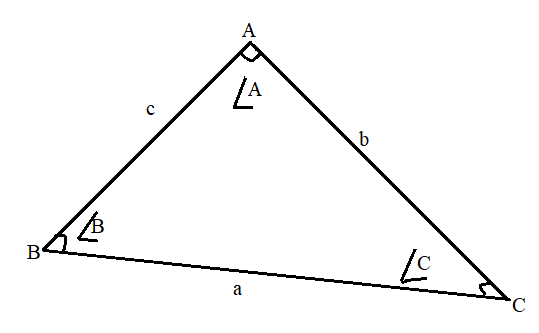
In a triangle ABC if 2∠A=3∠B=6∠C, then find the value of \[\dfrac{{\angle {\text{A + }}\angle {\text{B}}}}{{\angle {\text{C}}}} \times \angle {\text{B}}\].
Answer
613.2k+ views
- HINT- Proceed the solution of this question by assuming the given relation among angles of triangle equal to a certain variable and apply theorem i.e. sum of all the angles of triangle is 180°.
Complete step-by-step solution -

In ΔABC,
Let all the given relations among angles of ΔABC equal to x.
2∠A=3∠B=6∠C= x
So,
$ \Rightarrow \angle {\text{A = }}\dfrac{{\text{x}}}{2}$
$ \Rightarrow \angle {\text{B = }}\dfrac{{\text{x}}}{3}$
$ \Rightarrow \angle {\text{C = }}\dfrac{{\text{x}}}{6}$
We know that
Sum of all the angles of triangle is 180°
So on equalising sum of all angles to 180°
Therefore, $\angle {\text{A + }}\angle {\text{B + }}\angle {\text{C = 18}}{{\text{0}}^0}$
On putting the values of all angles
\[ \Rightarrow {\text{ }}\dfrac{{\text{x}}}{2} + \dfrac{{\text{x}}}{3} + \dfrac{{\text{x}}}{6} = {180^0}\]
On further solving
\[ \Rightarrow {\text{ }}\dfrac{{{\text{3x + 2x + x}}}}{6} = {\text{x = }}{180^0}\]
\[ \Rightarrow {\text{x = }}{180^0}\]
On putting the values of x in different angles
$ \Rightarrow \angle {\text{A = }}\dfrac{{{{180}^0}}}{2} = {90^0}$
$ \Rightarrow \angle {\text{B = }}\dfrac{{{{180}^0}}}{3} = {60^0}$
$ \Rightarrow \angle {\text{C = }}\dfrac{{{{180}^0}}}{6} = {30^0}$
In the given question, is asked the value of expression
\[ \Rightarrow \dfrac{{\angle {\text{A + }}\angle {\text{B}}}}{{\angle {\text{C}}}} \times \angle {\text{B = }}\dfrac{{{\text{9}}{{\text{0}}^0} + 6{{\text{0}}^0}}}{{{{30}^0}}} \times {60^0}\]
\[ \Rightarrow \dfrac{{\angle {\text{A + }}\angle {\text{B}}}}{{\angle {\text{C}}}} \times \angle {\text{B }} = {150^0} \times {20^0} = {3000^0}\]
Note- In this particular question, we should know that in a Euclidean space, the sum of angles of a triangle equals the straight angle (180 degrees, π radians, two right angles, or a half-turn). A triangle has three angles, one at each vertex, bounded by a pair of adjacent sides.
We can also see this thing as we know that the sum of all internal angles of a polygon is $\left( {{\text{n - 2}}} \right) \times {180^0}$ where n is the number of sides. As for triangle n = 3
Therefore, $\left( {{\text{3 - 2}}} \right) \times {180^0} = {180^0}$ i.e. sum of all the angles of the triangle is 180°.
Complete step-by-step solution -

In ΔABC,
Let all the given relations among angles of ΔABC equal to x.
2∠A=3∠B=6∠C= x
So,
$ \Rightarrow \angle {\text{A = }}\dfrac{{\text{x}}}{2}$
$ \Rightarrow \angle {\text{B = }}\dfrac{{\text{x}}}{3}$
$ \Rightarrow \angle {\text{C = }}\dfrac{{\text{x}}}{6}$
We know that
Sum of all the angles of triangle is 180°
So on equalising sum of all angles to 180°
Therefore, $\angle {\text{A + }}\angle {\text{B + }}\angle {\text{C = 18}}{{\text{0}}^0}$
On putting the values of all angles
\[ \Rightarrow {\text{ }}\dfrac{{\text{x}}}{2} + \dfrac{{\text{x}}}{3} + \dfrac{{\text{x}}}{6} = {180^0}\]
On further solving
\[ \Rightarrow {\text{ }}\dfrac{{{\text{3x + 2x + x}}}}{6} = {\text{x = }}{180^0}\]
\[ \Rightarrow {\text{x = }}{180^0}\]
On putting the values of x in different angles
$ \Rightarrow \angle {\text{A = }}\dfrac{{{{180}^0}}}{2} = {90^0}$
$ \Rightarrow \angle {\text{B = }}\dfrac{{{{180}^0}}}{3} = {60^0}$
$ \Rightarrow \angle {\text{C = }}\dfrac{{{{180}^0}}}{6} = {30^0}$
In the given question, is asked the value of expression
\[ \Rightarrow \dfrac{{\angle {\text{A + }}\angle {\text{B}}}}{{\angle {\text{C}}}} \times \angle {\text{B = }}\dfrac{{{\text{9}}{{\text{0}}^0} + 6{{\text{0}}^0}}}{{{{30}^0}}} \times {60^0}\]
\[ \Rightarrow \dfrac{{\angle {\text{A + }}\angle {\text{B}}}}{{\angle {\text{C}}}} \times \angle {\text{B }} = {150^0} \times {20^0} = {3000^0}\]
Note- In this particular question, we should know that in a Euclidean space, the sum of angles of a triangle equals the straight angle (180 degrees, π radians, two right angles, or a half-turn). A triangle has three angles, one at each vertex, bounded by a pair of adjacent sides.
We can also see this thing as we know that the sum of all internal angles of a polygon is $\left( {{\text{n - 2}}} \right) \times {180^0}$ where n is the number of sides. As for triangle n = 3
Therefore, $\left( {{\text{3 - 2}}} \right) \times {180^0} = {180^0}$ i.e. sum of all the angles of the triangle is 180°.
Recently Updated Pages
Master Class 10 Computer Science: Engaging Questions & Answers for Success

Master Class 10 General Knowledge: Engaging Questions & Answers for Success

Master Class 10 English: Engaging Questions & Answers for Success

Master Class 10 Social Science: Engaging Questions & Answers for Success

Master Class 10 Maths: Engaging Questions & Answers for Success

Master Class 10 Science: Engaging Questions & Answers for Success

Trending doubts
What is the median of the first 10 natural numbers class 10 maths CBSE

Which women's tennis player has 24 Grand Slam singles titles?

Who is the Brand Ambassador of Incredible India?

Why is there a time difference of about 5 hours between class 10 social science CBSE

Write a letter to the principal requesting him to grant class 10 english CBSE

A moving boat is observed from the top of a 150 m high class 10 maths CBSE




